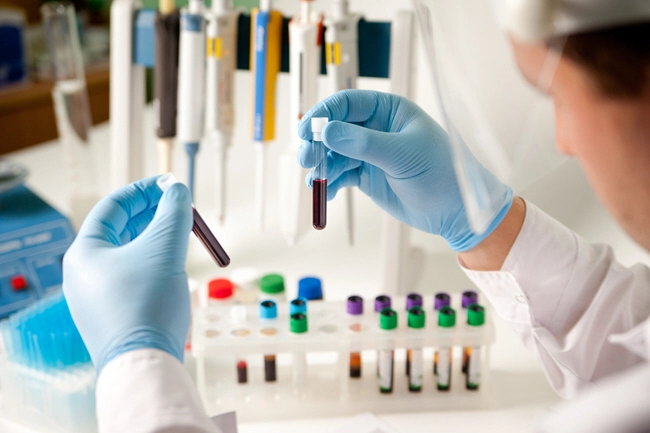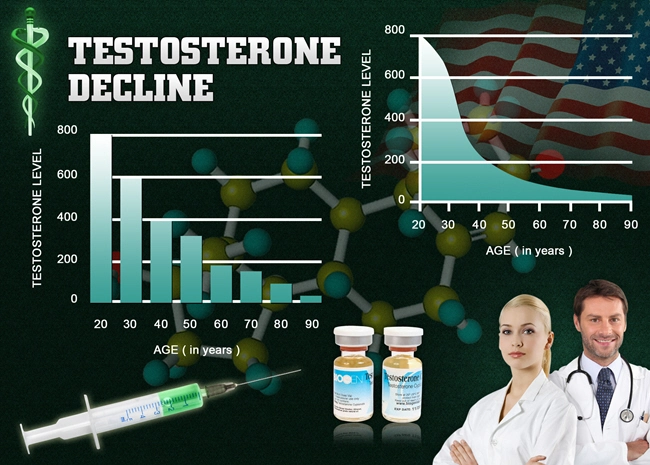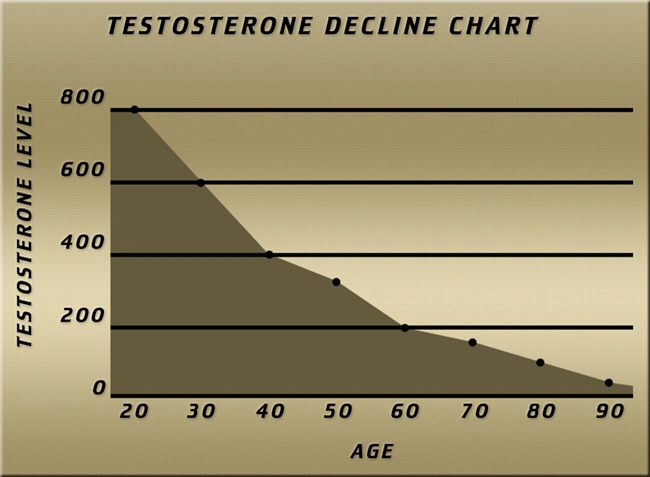
Introduction
Testosterone Deficiency Syndrome (TDS), also known as hypogonadism, is a prevalent condition among American males, characterized by low levels of testosterone that can lead to a variety of symptoms including decreased libido, fatigue, and mood disturbances. Recent research has pivoted towards exploring the potential of dietary interventions as a non-pharmacological approach to managing TDS. This article synthesizes findings from a systematic review of studies investigating the role of diet and nutrition in modulating testosterone levels and alleviating symptoms associated with TDS in American males.
Understanding Testosterone Deficiency Syndrome
Testosterone Deficiency Syndrome arises when the body fails to produce adequate levels of testosterone, a critical hormone responsible for male reproductive and secondary sexual characteristics. It affects a significant portion of the American male population, with prevalence increasing with age. The condition not only impacts quality of life but also correlates with increased risks of cardiovascular diseases, metabolic syndromes, and osteoporosis.
Dietary Interventions and Testosterone Levels
A growing body of evidence suggests that diet plays a pivotal role in testosterone production and metabolism. Diets rich in certain nutrients, such as zinc, vitamin D, and omega-3 fatty acids, have been shown to positively influence testosterone levels. For instance, zinc is essential for testosterone production, and deficiencies in this mineral can lead to reduced testosterone levels. Similarly, vitamin D, often referred to as the "sunshine vitamin," has been linked to testosterone synthesis, with studies demonstrating a positive correlation between vitamin D supplementation and increased testosterone levels.
The Role of Macronutrients
Macronutrient composition of the diet also appears to influence testosterone levels. Diets high in healthy fats, particularly monounsaturated and polyunsaturated fats, have been associated with higher testosterone levels. Conversely, excessive carbohydrate intake, especially from refined sources, may lead to insulin resistance, which can negatively impact testosterone production. A balanced intake of protein is also crucial, as amino acids serve as the building blocks for testosterone synthesis.
Specific Dietary Patterns and TDS
Certain dietary patterns have been studied for their potential effects on testosterone levels. The Mediterranean diet, characterized by high intakes of fruits, vegetables, whole grains, legumes, nuts, and olive oil, has been linked to improved testosterone levels. This diet's emphasis on healthy fats and nutrient-dense foods may contribute to its beneficial effects on hormonal health. Additionally, the ketogenic diet, which is high in fats and low in carbohydrates, has been explored for its potential to enhance testosterone levels by improving insulin sensitivity and reducing body fat, both of which can positively influence testosterone production.
Challenges and Considerations
While dietary interventions show promise in managing TDS, several challenges and considerations must be addressed. Individual variability in response to dietary changes, the complexity of hormonal regulation, and the influence of other lifestyle factors such as exercise and sleep need to be considered. Moreover, long-term studies are needed to establish the sustainability and efficacy of dietary interventions in maintaining optimal testosterone levels over time.
Conclusion
The systematic review of dietary interventions for managing Testosterone Deficiency Syndrome in American males underscores the potential of diet and nutrition as a viable strategy for improving testosterone levels and alleviating associated symptoms. Diets rich in essential nutrients, balanced macronutrient composition, and specific dietary patterns such as the Mediterranean and ketogenic diets show promise in enhancing hormonal health. However, further research is essential to refine these dietary strategies and tailor them to individual needs, ensuring a holistic approach to managing TDS. As the understanding of diet's role in hormonal health continues to evolve, American males can leverage these insights to optimize their diet and improve their quality of life.
Contact Us Today For A Free Consultation
Dear Patient,
Once you have completing the above contact form, for security purposes and confirmation, please confirm your information by calling us.
Please call now: 1-800-380-5339.
Welcoming You To Our Clinic, Professor Tom Henderson.

- Testosterone Deficiency in American Men: Symptoms, Diagnosis, and Holistic Management [Last Updated On: March 15th, 2025] [Originally Added On: March 15th, 2025]
- Managing Testosterone Deficiency in Aging American Men: Symptoms, Diagnosis, and Treatment [Last Updated On: March 18th, 2025] [Originally Added On: March 18th, 2025]
- Alcohol's Impact on Testosterone and Risk of Deficiency Syndrome in American Males [Last Updated On: March 19th, 2025] [Originally Added On: March 19th, 2025]
- Testosterone Deficiency Syndrome: Symptoms, Importance of Regular Check-ups, and Treatment Benefits [Last Updated On: March 19th, 2025] [Originally Added On: March 19th, 2025]
- Testosterone Deficiency in American Men: Symptoms, Diagnosis, and Energy Impact [Last Updated On: March 19th, 2025] [Originally Added On: March 19th, 2025]
- Stress and Testosterone Deficiency: Mechanisms, Evidence, and Management Strategies [Last Updated On: March 19th, 2025] [Originally Added On: March 19th, 2025]
- Testosterone Deficiency Syndrome: Symptoms, Diagnosis, and Hormone Therapy Benefits [Last Updated On: March 20th, 2025] [Originally Added On: March 20th, 2025]
- Testosterone Deficiency Syndrome: Impacts on Muscle Mass and Health in American Men [Last Updated On: March 20th, 2025] [Originally Added On: March 20th, 2025]
- Environmental Toxins and Testosterone Deficiency in American Males: Public Health Implications [Last Updated On: March 21st, 2025] [Originally Added On: March 21st, 2025]
- Testosterone Deficiency Syndrome: Impacts, Management, and Prostate Health Considerations [Last Updated On: March 21st, 2025] [Originally Added On: March 21st, 2025]
- Testosterone Deficiency Syndrome: Impacts on Skin Health and Management Strategies for American Men [Last Updated On: March 21st, 2025] [Originally Added On: March 21st, 2025]
- Smoking's Impact on Testosterone Deficiency in American Males: Risks and Management [Last Updated On: March 22nd, 2025] [Originally Added On: March 22nd, 2025]
- Testosterone Deficiency Syndrome: Impacts and Management of Joint Health in American Males [Last Updated On: March 22nd, 2025] [Originally Added On: March 22nd, 2025]
- Zinc's Vital Role in Treating Testosterone Deficiency Syndrome in American Men [Last Updated On: March 22nd, 2025] [Originally Added On: March 22nd, 2025]
- Testosterone Deficiency and Mood Disorders: Insights and Management for American Men [Last Updated On: March 22nd, 2025] [Originally Added On: March 22nd, 2025]
- High-Fat Diets and Testosterone: Impacts and Dietary Recommendations for American Males [Last Updated On: March 22nd, 2025] [Originally Added On: March 22nd, 2025]
- Testosterone Deficiency in American Men: Impacts on Cognitive Function and Health Strategies [Last Updated On: March 23rd, 2025] [Originally Added On: March 23rd, 2025]
- Diet Soda's Impact on Testosterone Levels in American Men with TDS [Last Updated On: March 23rd, 2025] [Originally Added On: March 23rd, 2025]
- Weight Training Benefits for Men with Testosterone Deficiency Syndrome [Last Updated On: March 23rd, 2025] [Originally Added On: March 23rd, 2025]
- Testosterone Deficiency and Depression: Understanding the Link in American Men [Last Updated On: March 23rd, 2025] [Originally Added On: March 23rd, 2025]
- Testosterone Deficiency Linked to Hearing Loss in American Males: Insights and Management [Last Updated On: March 23rd, 2025] [Originally Added On: March 23rd, 2025]
- Vitamin D's Role in Managing Testosterone Deficiency in American Males [Last Updated On: March 24th, 2025] [Originally Added On: March 24th, 2025]
- Testosterone Deficiency Syndrome: Impact on Libido and Health in American Men [Last Updated On: March 24th, 2025] [Originally Added On: March 24th, 2025]
- Testosterone Deficiency and Sleep Apnea: Interconnected Health Risks in American Males [Last Updated On: March 24th, 2025] [Originally Added On: March 24th, 2025]
- Testosterone Deficiency and Anemia: Understanding the Link and Treatment Options for American Males [Last Updated On: March 24th, 2025] [Originally Added On: March 24th, 2025]
- Testosterone Deficiency Impacts Body Composition in American Males: Health Implications [Last Updated On: March 25th, 2025] [Originally Added On: March 25th, 2025]
- Magnesium's Role in Managing Testosterone Deficiency in American Males [Last Updated On: March 25th, 2025] [Originally Added On: March 25th, 2025]
- Testosterone Deficiency Syndrome: Understanding Its Link to Hair Loss in American Men [Last Updated On: March 25th, 2025] [Originally Added On: March 25th, 2025]
- Chronic Illness and Testosterone Deficiency: Impacts and Management Strategies for American Males [Last Updated On: March 25th, 2025] [Originally Added On: March 25th, 2025]
- Testosterone Deficiency Syndrome: Impacts and Management in American Athletes [Last Updated On: March 26th, 2025] [Originally Added On: March 26th, 2025]
- Testosterone Deficiency in Men: Impacts on Vision and Eye Health [Last Updated On: March 26th, 2025] [Originally Added On: March 26th, 2025]
- Testosterone Deficiency Syndrome: Impacts on Immune Function in American Men [Last Updated On: March 26th, 2025] [Originally Added On: March 26th, 2025]
- Chronic Stress Impact on Testosterone Levels and TDS in American Males [Last Updated On: March 26th, 2025] [Originally Added On: March 26th, 2025]
- Pesticide Exposure Linked to Testosterone Deficiency in American Men: A Public Health Concern [Last Updated On: March 26th, 2025] [Originally Added On: March 26th, 2025]
- Shift Work's Impact on Testosterone Levels and TDS Risk in American Males [Last Updated On: March 26th, 2025] [Originally Added On: March 26th, 2025]
- Boron's Role in Managing Testosterone Deficiency in U.S. Males: A Promising Adjunct [Last Updated On: March 26th, 2025] [Originally Added On: March 26th, 2025]
- Testosterone Deficiency Linked to Kidney Health Risks in American Men [Last Updated On: March 26th, 2025] [Originally Added On: March 26th, 2025]
- Testosterone Deficiency in American Males: Impacts on Memory and Cognitive Health [Last Updated On: March 26th, 2025] [Originally Added On: March 26th, 2025]
- Testosterone Deficiency in American Males: Impacts on Dental Health and Management Strategies [Last Updated On: March 27th, 2025] [Originally Added On: March 27th, 2025]
- Soy Consumption and Testosterone Levels in American Men with TDS: A Comprehensive Analysis [Last Updated On: March 27th, 2025] [Originally Added On: March 27th, 2025]
- Blue Light Exposure and Testosterone Levels: Managing TDS in American Men [Last Updated On: March 27th, 2025] [Originally Added On: March 27th, 2025]
- Testosterone Deficiency Linked to Increased Gallbladder Disease Risk in American Males [Last Updated On: March 27th, 2025] [Originally Added On: March 27th, 2025]
- Plasticizers' Impact on Testosterone Levels and TDS in American Men: An Emerging Concern [Last Updated On: March 28th, 2025] [Originally Added On: March 28th, 2025]
- Heavy Metal Exposure and Its Impact on Testosterone Levels in American Men [Last Updated On: March 28th, 2025] [Originally Added On: March 28th, 2025]
- Testosterone Deficiency Syndrome: Impacts on Liver Health and Management Strategies [Last Updated On: March 28th, 2025] [Originally Added On: March 28th, 2025]
- Omega-3 Fatty Acids: A Promising Approach to Managing Testosterone Deficiency in Men [Last Updated On: March 28th, 2025] [Originally Added On: March 28th, 2025]
- Air Pollution's Impact on Testosterone Deficiency in American Males: A Public Health Concern [Last Updated On: March 28th, 2025] [Originally Added On: March 28th, 2025]
- EMFs and Testosterone: Understanding Impacts and Mitigation Strategies for Male Health [Last Updated On: March 28th, 2025] [Originally Added On: March 28th, 2025]
- Testosterone Deficiency and Thyroid Function: Interplay and Management in American Males [Last Updated On: March 30th, 2025] [Originally Added On: March 30th, 2025]
- Fenugreek: A Natural Remedy for Testosterone Deficiency Syndrome in American Males [Last Updated On: March 30th, 2025] [Originally Added On: March 30th, 2025]
- Testosterone Deficiency Linked to Pancreatic Health: Implications for American Men [Last Updated On: March 31st, 2025] [Originally Added On: March 31st, 2025]
- Testosterone Deficiency Syndrome: Impact, Diagnosis, and Management in American Men [Last Updated On: April 1st, 2025] [Originally Added On: April 1st, 2025]
- Testosterone Deficiency Syndrome: Impact of Adrenal Health and Holistic Treatment Approaches [Last Updated On: April 2nd, 2025] [Originally Added On: April 2nd, 2025]
- Noise Pollution's Impact on Testosterone Levels and TDS in American Males [Last Updated On: April 5th, 2025] [Originally Added On: April 5th, 2025]
- Tribulus Terrestris: A Natural Approach to Managing Testosterone Deficiency in American Men [Last Updated On: April 5th, 2025] [Originally Added On: April 5th, 2025]
- Testosterone Deficiency and Parathyroid Health: Impacts and Management Strategies [Last Updated On: April 7th, 2025] [Originally Added On: April 7th, 2025]
- Testosterone Deficiency Syndrome: Hypothalamic Role and Management in American Men [Last Updated On: April 7th, 2025] [Originally Added On: April 7th, 2025]
- Fluoride Exposure and Testosterone Levels: Implications for TDS in American Men [Last Updated On: April 7th, 2025] [Originally Added On: April 7th, 2025]
- Pineal Gland's Role in Testosterone Deficiency Syndrome Among American Males [Last Updated On: April 8th, 2025] [Originally Added On: April 8th, 2025]
- DHEA Supplementation: A Promising Treatment for Testosterone Deficiency Syndrome in Men [Last Updated On: April 9th, 2025] [Originally Added On: April 9th, 2025]
- Ginseng's Potential Role in Managing Testosterone Deficiency in U.S. Males [Last Updated On: April 9th, 2025] [Originally Added On: April 9th, 2025]
- BPA Exposure Linked to Lower Testosterone Levels in American Men: TDS Implications [Last Updated On: April 10th, 2025] [Originally Added On: April 10th, 2025]
- Testosterone Deficiency Syndrome: Impacts on Respiratory Health in American Males [Last Updated On: April 10th, 2025] [Originally Added On: April 10th, 2025]
- Phthalates' Role in Testosterone Deficiency Syndrome Among American Males [Last Updated On: April 11th, 2025] [Originally Added On: April 11th, 2025]
- PFC Exposure Linked to Testosterone Deficiency in American Males: Emerging Evidence [Last Updated On: April 12th, 2025] [Originally Added On: April 12th, 2025]
- Testosterone Deficiency Syndrome: Impacts on Gastrointestinal Health and Management Strategies [Last Updated On: April 13th, 2025] [Originally Added On: April 13th, 2025]
- Testosterone Deficiency in American Men: Impacts and Management of Urinary Health [Last Updated On: April 13th, 2025] [Originally Added On: April 13th, 2025]
- Testosterone Deficiency in American Males: Impact of Endocrine Disruptors and Mitigation Strategies [Last Updated On: April 15th, 2025] [Originally Added On: April 15th, 2025]
- Testosterone Deficiency Syndrome: Impacts and Management for American Males [Last Updated On: April 16th, 2025] [Originally Added On: April 16th, 2025]
- Testosterone Deficiency and Autoimmune Disorders: Impact and Management in American Males [Last Updated On: April 16th, 2025] [Originally Added On: April 16th, 2025]
- Cordyceps: A Natural Ally in Managing Testosterone Deficiency Syndrome [Last Updated On: April 17th, 2025] [Originally Added On: April 17th, 2025]
- Testosterone Deficiency in American Men: Impacts on Metabolic Health and Management Strategies [Last Updated On: April 17th, 2025] [Originally Added On: April 17th, 2025]
- Shilajit's Potential in Managing Testosterone Deficiency in American Men [Last Updated On: April 17th, 2025] [Originally Added On: April 17th, 2025]
- Testosterone Deficiency in American Males: Impacts on Neurological Health and Management Strategies [Last Updated On: April 18th, 2025] [Originally Added On: April 18th, 2025]
- Triclosan Exposure and Testosterone Levels in American Men with TDS [Last Updated On: April 19th, 2025] [Originally Added On: April 19th, 2025]
- Parabens' Impact on Testosterone Levels in American Males: Implications for TDS [Last Updated On: April 20th, 2025] [Originally Added On: April 20th, 2025]
- Phytoestrogens' Impact on Testosterone Levels in American Men with TDS [Last Updated On: April 20th, 2025] [Originally Added On: April 20th, 2025]
- Organophosphate Pesticides Linked to Testosterone Deficiency in American Males [Last Updated On: April 20th, 2025] [Originally Added On: April 20th, 2025]
- Lifestyle Factors and Testosterone Deficiency in American Males: A Multivariate Analysis [Last Updated On: April 21st, 2025] [Originally Added On: April 21st, 2025]
- TDS Impact on American Males: Age-Specific Effects and Management Strategies [Last Updated On: April 22nd, 2025] [Originally Added On: April 22nd, 2025]








